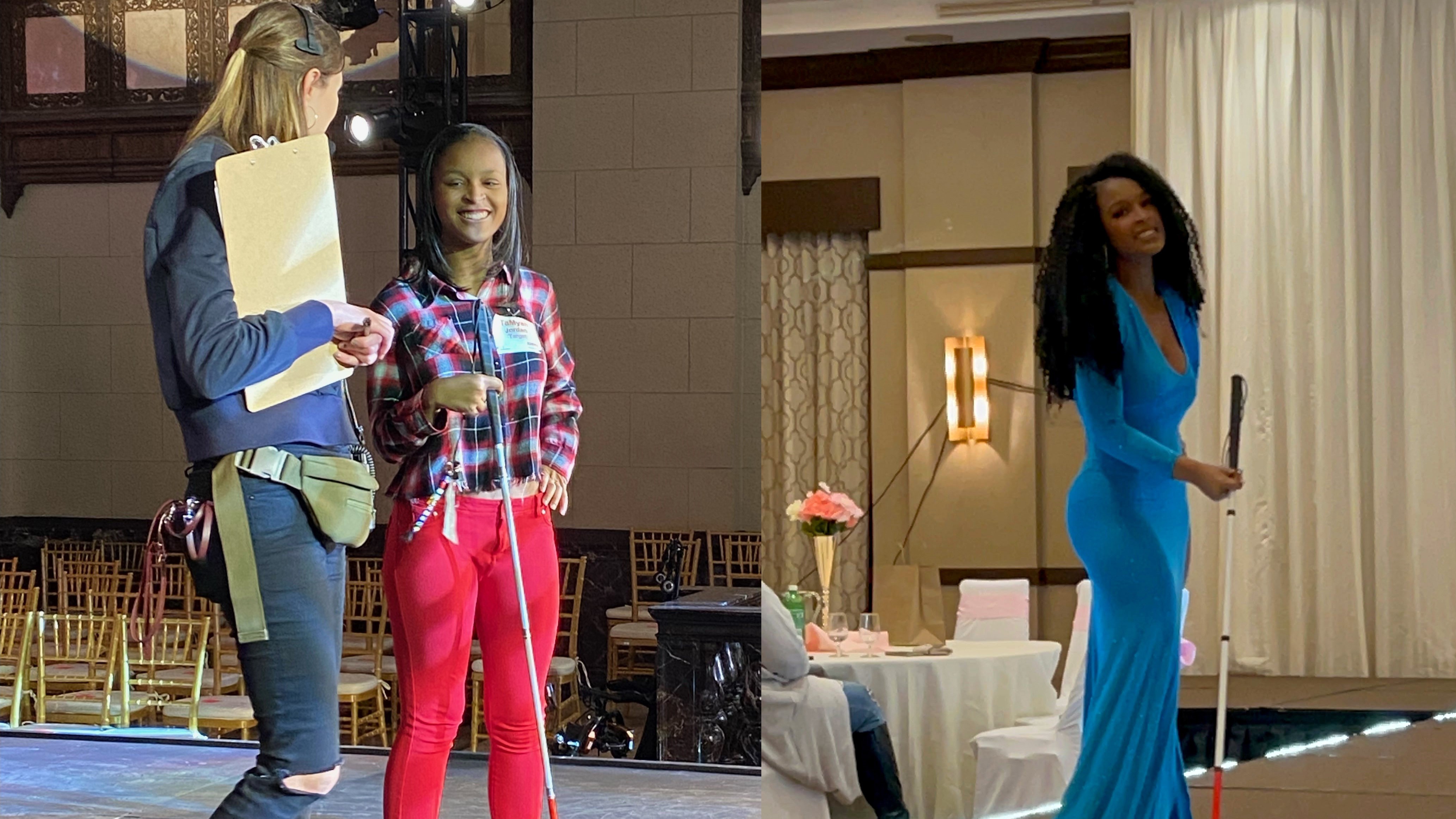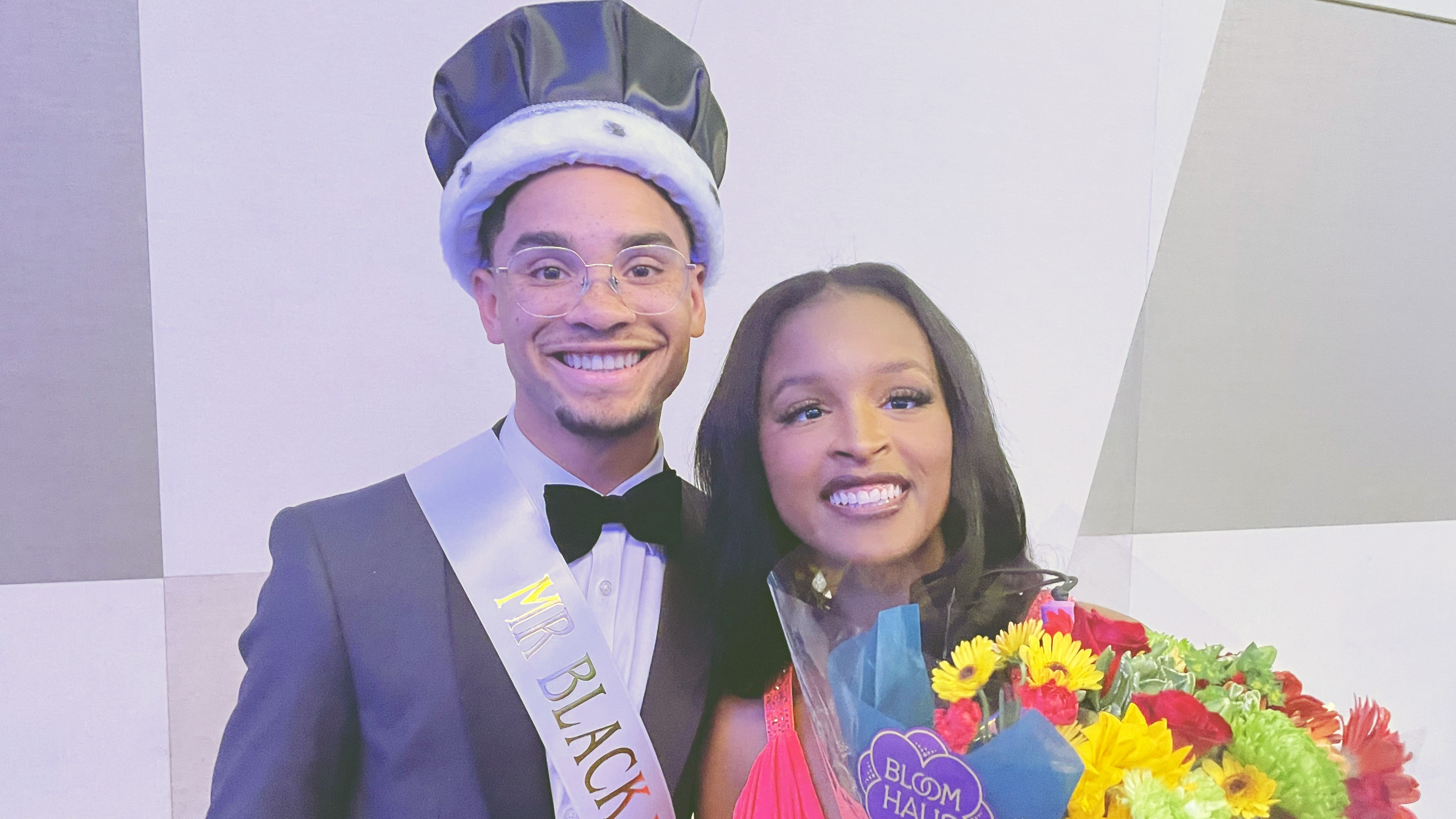UK student wants to change the world for people with disabilities through fashion
UK student wants to change the world for people with disabilities through fashion

TaMyah Jordan is a first-year student attending the University of Kentucky Martin-Gatton College of Agriculture, Food and Environment, studying Environment’s Merchandising, Apparel and Textiles program (MAT). Jordan is visually impaired, and for two-thirds of her life, has used her cane to safely navigate cities, access public transportation and even lead her down fashion catwalks.
Now, Jordan uses the cane to make her way across the University of Kentucky campus, where she prepares to one day design the fashions she has modeled for the past decade with a twist. The first-year trendsetter plans to create chic, inclusive, accessible fashions anyone—especially those with vision difficulties—can wear with confidence.
“I want to make clothes that are easier for visually impaired people to identify what they’re putting on—what the color is, what the size is, what’s the front and what’s the back,” Jordan explains. “Those aren’t the things the average person thinks about while shopping.”
Born and raised near Nashville, Tennessee, Jordan lost her sight in just 24 hours from bilateral optic atrophy caused by a rare, previously undetected brain tumor known as pilocytic astrocytoma. She was six. She does not have vivid recollections — only those from the repeated retellings she has heard.
The trauma of her sudden blindness was tempered by life skills learned from her hero: her mother, Tonika East, Ed.D., a former Metro Nashville Public Schools pre-kindergarten special education teacher and an expert in job training for people with disabilities.
Buoyed by their faith that a higher power had an unrevealed purpose for their daughter, Jordan’s parents enrolled her in a school specializing in educating blind children. Beginning at age seven, Jordan awoke at 3:15 a.m. daily to catch the three-hour bus ride to the Tennessee School for the Blind in Nashville. Through their choices and actions, her parents impressed upon her the value of self-reliance.
“One of the hardest decisions for us as parents was to send her three hours away,” said East, now the director of lifelong learning in the Kentucky Office of Adult Education. “It was important for TaMyah to do the things that she did before she lost her sight. At the regular school, everybody wanted to do everything for her, but TaMyah needed to figure out how to do things on her own. I still tell her, ‘Society doesn’t feel sorry for you. Mean kids are going to be mean adults. Don’t try to change people and just live your best life.’ She walks with grace. She doesn’t complain at all.”

At eight, Jordan appeared in an American Girl Fashion Show in Nashville. From there, her interest in fashion blossomed. In the ensuing decade, she worked runways in New York and Los Angeles, represented brands such as Target and Meijer and advised Victoria’s Secret with her perspective on their recently released line of adaptive intimates.
Jordan chose to attend UK for a myriad of reasons. She cites the university’s abundance of available disability services as a significant factor. She also received numerous scholarships—including the coveted Elmer S. “Shucks” Stafford Memorial, the Dorn Family and the William C. Parker Scholarships, among others—to help finance her education.
“I’ve been able to come to UK and not have debt,” Jordan says. “This generosity has allowed me to go and do what I want without obstacles. My mom always told me, ‘Don’t let money be the reason why you don’t attend a specific school.’ But you’ve got to think, ‘Well, I’ve still got to pay for it,’ so the scholarships have greatly helped.”
Jordan is still settling into her life as a college student. In between her rigorous course load, she is getting involved in campus activities. She has joined UK’s chapters of College Mentors for Kids and Minorities in Agriculture, Natural Resources and Related Sciences (MANRRS). In October, she even entered the Ms. Black UK pageant.

While many contemplate how a visually impaired individual can navigate the visually intensive domain of fashion design, Jordan unreservedly addresses inquiries about her impairment and her methods for overcoming challenges.
The word “blind” is slightly misleading. For Jordan, blind denotes complete darkness. She prefers to use the phrase “visually impaired.” She has light perception and can distinguish outlines and shadows. Depending on the ambient lighting, she can differentiate some colors. Using the terminology “visually impaired” opens the conversation for others to ask questions.
“I’m very open; I want to be able to let people know that it’s okay to ask me those questions you can’t ask anyone else. If I just say, ‘I’m blind,’ the first thing you think is I can’t see anything at all, just darkness,” reasons Jordan. “But that’s not my vision. If I use ‘visually impaired,’ it makes you open to ask the question, ‘Well, what can you see?’”
With this information, people begin to understand why Jordan’s favorite clothes are purple “with ruffley sleeves” and, hopefully, embellished with sequins, rhinestones or paillettes that will provide visual stimulation from the dancing light. They learn how she uses her limited perception and strips of tape on the floor during fashion shows to avoid tumbling off the catwalk.
They come to understand how her enhanced memory aids her in navigating daily life, enabling her to distinguish and identify individuals—even from across the room—by their distinct voices and, with the aid of an audio description device, tap into memories to “see” movies.
Jordan already anticipates the opportunities that await her. She is eager to leverage study-abroad opportunities in Italy and Paris, channeling her knowledge into clothing that promotes comfort and self-assurance for all. Jordan believes that, through fashion, she can change perceptions about what it means to have limited sight.
“A person with a visual impairment isn’t any less capable than anybody who’s fully sighted,” Jordan says. “We’re all capable of doing anything we want to do.”
– 30 –
The Martin-Gatton College of Agriculture, Food and Environment is an Equal Opportunity Organization with respect to education and employment and authorization to provide research, education information and other services only to individuals and institutions that function without regard to economic or social status and will not discriminate on the basis of race, color, ethnic origin, national origin, creed, religion, political belief, sex, sexual orientation, gender identity, gender expression, pregnancy, marital status, genetic information, age, veteran status, physical or mental disability or reprisal or retaliation for prior civil rights activity.
Retailing & Tourism Management Students
